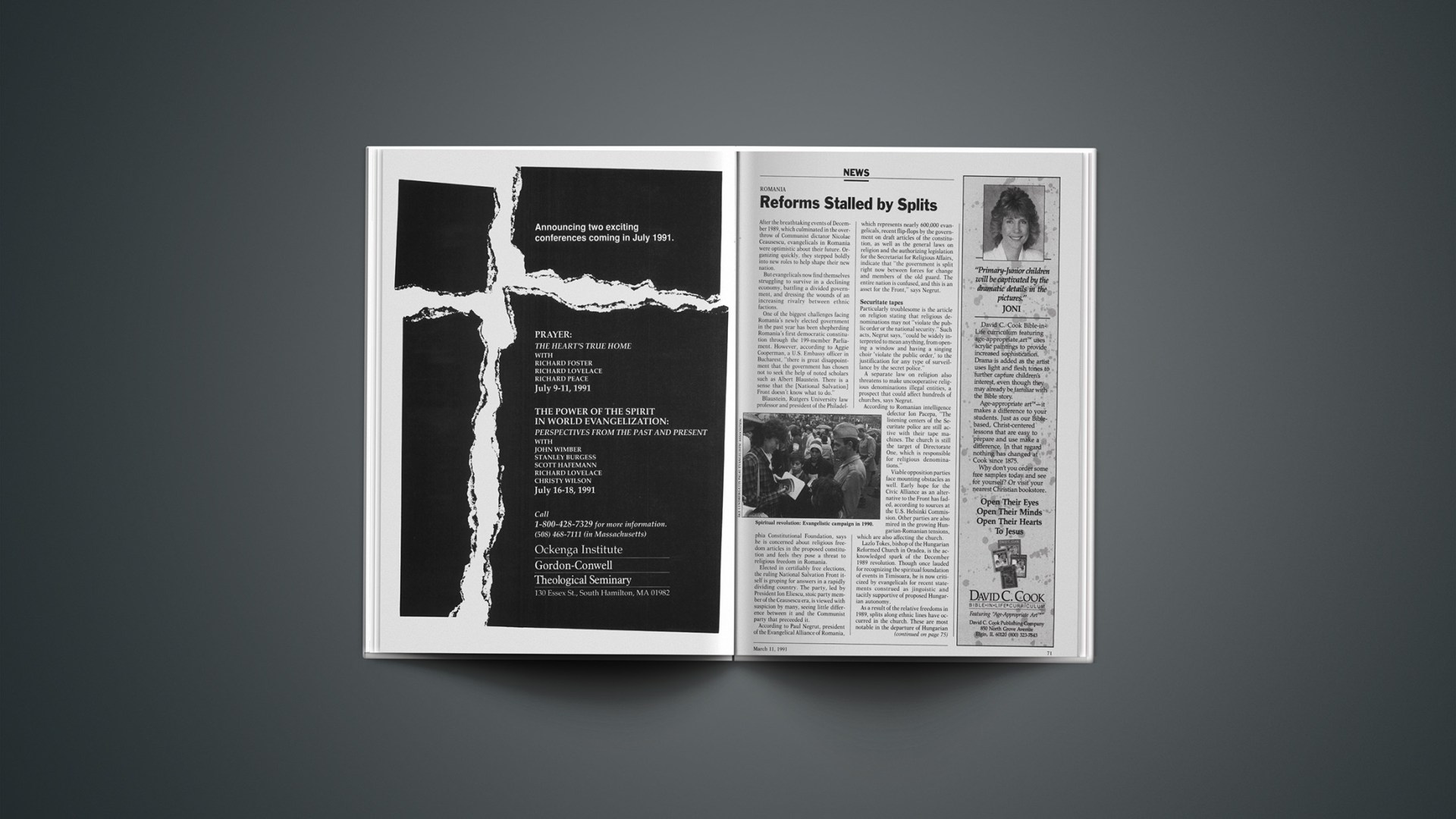After the breathtaking events of December 1989, which culminated in the overthrow of Communist dictator Nicolae Ceausescu, evangelicals in Romania were optimistic about their future. Organizing quickly, they stepped boldly into new roles to help shape their new nation.
But evangelicals now find themselves struggling to survive in a declining economy, battling a divided government, and dressing the wounds of an increasing rivalry between ethnic factions.
One of the biggest challenges facing Romania’s newly elected government in the past year has been shepherding Romania’s first democratic constitution through the 199-member Parliament. However, according to Aggie Cooperman, a U.S. Embassy officer in Bucharest, “there is great disappointment that the government has chosen not to seek the help of noted scholars such as Albert Blaustein. There is a sense that the [National Salvation] Front doesn’t know what to do.”
Blaustein, Rutgers University law professor and president of the Philadelphia Constitutional Foundation, says he is concerned about religious freedom articles in the proposed constitution and feels they pose a threat to religious freedom in Romania.
Elected in certifiably free elections, the ruling National Salvation Front itself is groping for answers in a rapidly dividing country. The party, led by President Ion Eliescu, stoic party member of the Ceausescu era, is viewed with suspicion by many, seeing little difference between it and the Communist party that preceeded it.
According to Paul Negrut, president of the Evangelical Alliance of Romania, which represents nearly 600,000 evangelicals, recent flip-flops by the government on draft articles of the constitution, as well as the general laws on religion and the authorizing legislation for the Secretariat for Religious Affairs, indicate that “the government is split right now between forces for change and members of the old guard. The entire nation is confused, and this is an asset for the Front,” says Negrut.
Securitate Tapes
Particularly troublesome is the article on religion stating that religious denominations may not “violate the public order or the national security.” Such acts, Negrut says, “could be widely interpreted to mean anything, from opening a window and having a singing choir ‘violate the public order,’ to the justification for any type of surveillance by the secret police.”
A separate law on religion also threatens to make uncooperative religious denominations illegal entities, a prospect that could affect hundreds of churches, says Negrut.
According to Romanian intelligence defector Ion Pacepa, “The listening centers of the Securitate police are still active with their tape machines. The church is still the target of Directorate One, which is responsible for religious denominations.”
Viable opposition parties face mounting obstacles as well. Early hope for the Civic Alliance as an alternative to the Front has faded, according to sources at the U.S. Helsinki Commission. Other parties are also mired in the growing Hungarian-Romanian tensions, which are also affecting the church.
Lazlo Tokes, bishop of the Hungarian Reformed Church in Oradea, is the acknowledged spark of the December 1989 revolution. Though once lauded for recognizing the spiritual foundation of events in Timisoara, he is now criticized by evangelicals for recent statements construed as jingoistic and tacitly supportive of proposed Hungarian autonomy.
As a result of the relative freedoms in 1989, splits along ethnic lines have occurred in the church. These are most notable in the departure of Hungarian Baptists from the Romanian Baptist Union and their formation of the independent Hungarian Baptist Union of Romania, which has sought membership in the European Baptist Federation. Says Pastor Nicolae Gheorghita, head of the Second Baptist Church in Oradea and the largest Baptist church in Europe, “I’m not a chauvinist, but I believe some things that Pastor Tokes has said have caused real divisions amongst the evangelicals.”
In response, Tokes says, “We feel the hatred and fear even more. It is strange that after the revolution, one is exposed to more danger. Last year, at least, I felt the sympathy and solidarity from all the people in Romania, because our only enemy was the Ceausescu clan and the Securitate. Now, what is strange is the fact that the hatred is embodied in a crowd that has turned on my people after I spoke out on their behalf. And that’s a kind of schizophrenic situation, having your brethren, your friends, become your enemy.”
Hope And Intermarriage
Unfortunately, among Protestant evangelicals in Transylvania, there is growing sentiment favoring radical right-wing, anti-Hungarian groups, such as Uniunea Vatra Romaneasca. It has been criticized for its collaboration with the Securitate and its participation in the bloody riots in Tirgu Mures in late March 1990.
Such conflicts are not likely to subside and may threaten any move toward political and religious stability. Yet at the street level, in villages throughout Transylvania, individuals only talk of the harmony and the increasing rate of intermarriages between Hungarians and Romanians.
At the political level, there are hopes of increasing dialogue. Says Geza Szocs, 37, an assistant to the head of the Hungarian Democratic party of Romania, “We feel that time will bring reconciliation between the two groups, but what matters now is how the government is going to proceed to bring Romania out of this darkness.”
Moise Velescu, 70, reflects on the changes one year has brought to Romania after the revolution. Velescu, leader of the Lord’s Army movement in Arad, a loose federation of evangelicals in the Romanian Orthodox Church, says, “Since the revolution, all we want to do is to proclaim Jesus.” Velescu senses that a reformation within Orthodoxy and the country as a whole will come. But he concedes, “It may take some time, a long time.”










